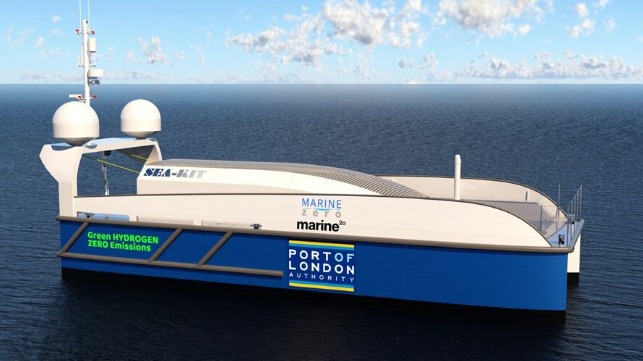UK Competition Funds Project for Hydrogen Fueling and USV Demonstrator

An innovative project involving the Port of London as one of the partners looks to develop a hydrogen infrastructure that will provide power for the future maritime industry. The project includes the development of the onshore infrastructure and would deploy an uncrewed surface vessel for surveys as the first vessel to employ the process.
The Port of London Authority (PLA), a consortium partner, will host the hydrogen refilling station on the River Thames in London and subsequently operate the ZEPHR USV. The two phases of the project focus on the design and integration of the dispensing facility which includes the land-based infrastructure to produce green hydrogen, via renewable energy and the electrolysis of water, as part of the project. The demonstration vessel will be developed by SEA-KIT International.
Dubbed ZEPHR - Zero Emissions Ports Hydrogen Refilling Survey Vessel, the project aims to extend vessel operation for port operators and stakeholders through complete energy transferal, from readily accessible green electricity to 100 percent green hydrogen production, compression, storage, and dispensing.
The project organizers highlight that the Thames is Britain's busiest inland waterway, handling over five million tonnes of goods and materials and millions of passengers each year. The Thames Estuary is, therefore, they contend well placed to support the development of a hydrogen ecosystem, with significant potential usage demand across several sectors, including ports, marine and river transportation, airports and aviation, construction, distribution, and logistics.
SEA-KIT says the configurable ZEPHR USV platform will have a high-resolution multibeam echosounder as its primary payload, with the capability to mount additional sensors such as LiDAR, cameras, and environmental monitoring and sampling equipment. The vessel will also be able to launch and recover aerial drones for surveying, surveillance, search and rescue. ZEPHR will use two hydrogen fuel cell systems for redundancy.

that matters most
Get the latest maritime news delivered to your inbox daily.
The vessel’s design will be reviewed with Lloyd’s Register and the Maritime and Coastguard Agency to satisfy regulatory and compliance requirements and to obtain approvals for continuous operations.
The five-year project is another of the proposals that was selected and will receive funding from the Zero Emissions Vessels and Infrastructure (ZEVI) competition. The UK is sponsoring the competition and providing funding for projects that will develop and demonstrate new technologies that contribute to the decarbonization of the maritime sector. The competition requires the winner to begin their demonstration by 2025.
